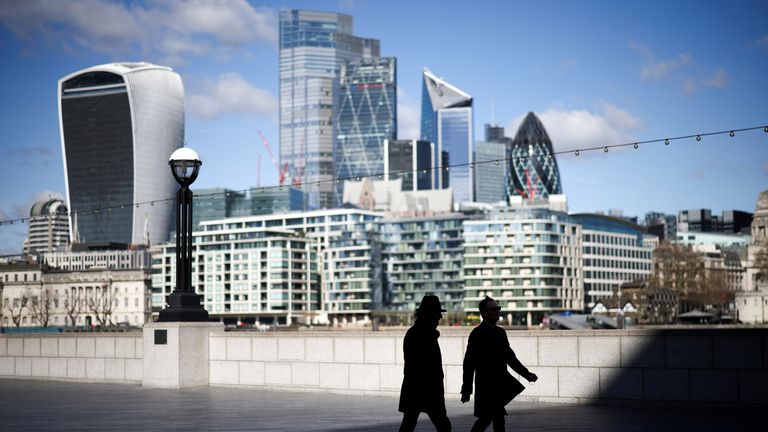The UK’s economic bounce-back has slowed sharply partly thanks to the impact of the “pingdemic” causing workers to isolate, according to a key business survey.
A “flash” estimate of private sector activity for July showed the weakest expansion since March as Britain’s firms battle to recover from the coronavirus crisis.
The reading of 57.7 – where the 50-mark separates growth from contraction – was down from 62.2 in June, according to the IHS Markit/CIPS purchasing managers’ index (PMI).
COVID-19: UK food shortage fearedIt said the impact of COVID-19 isolation on staff availability and severe shortages of raw materials were among the factors behind the slowdown.
Supermarkets and hauliers have in recent days said worker shortages are making it harder for them to restock shelves and deliver goods while some factories are also struggling to maintain production.
AdvertisementChris Willamson, chief business economist at IHS Markit, said: “July saw the UK economy’s recent growth spurt stifled by the rising wave of virus infections, which subdued customer demand, disrupted supply chains and caused widespread staff shortages, and also cast a darkening shadow over the outlook.”
The economy has been recovering in recent months after pandemic lockdowns crushed business activity over much of the past year and precipitated the worst annual collapse in GDP for three centuries in 2020.
More from Business ‘No point’ sparing food suppliers from pingdemic when shop workers still absent, says retailer COVID-19: Self-isolation exemption for food supply chain staff will not be extended to other businesses, says minister COVID-19: List of 16 sectors where workers may be exempt from isolation revealed KKR joins scrum of bidders for stake in Rugby World Cup organiser Euro 2020 delivers boost for retail sales but clothes stores slip back Twitter quarterly ad sales top $1bn as reopening lifts demandForecasts suggest Britain will experience its biggest rebound since the Second World War in 2021 but the latest survey figures showed sentiment declining – with optimism about the business outlook the lowest for nine months.
The data showed some bright spots with staycations boosting consumer spending, rising demand for business services, and strong order books for manufacturers.
‘Thank goodness’ for recovery – but longer term relatively weak, says BoE governorBut elsewhere business disruption saw orders slowing while some firms reported a drop in consumer confidence due to the pandemic and others were still suffering from Brexit-related export difficulties.
Meanwhile employment growth was its slowest since March while costs shot up at the fastest pace since the survey began in 1998 thanks to wage growth, higher transport bills and price hikes by suppliers.
The report comes as official figures showed retail sales returned to growth in June thanks to demand for food and drink during Euro 2020 though clothing and other non-food sales slipped back.
Monthly GDP data for May published recently showed growth already slowing after an initial spurt earlier in the year as the economy recovered from the impact of the latest lockdown.
Gabriella Dickens, senior UK economist at Pantheon Macroeconomics, said: “The sharp fall in July’s composite PMI provides further evidence that the economic recovery is faltering.”
